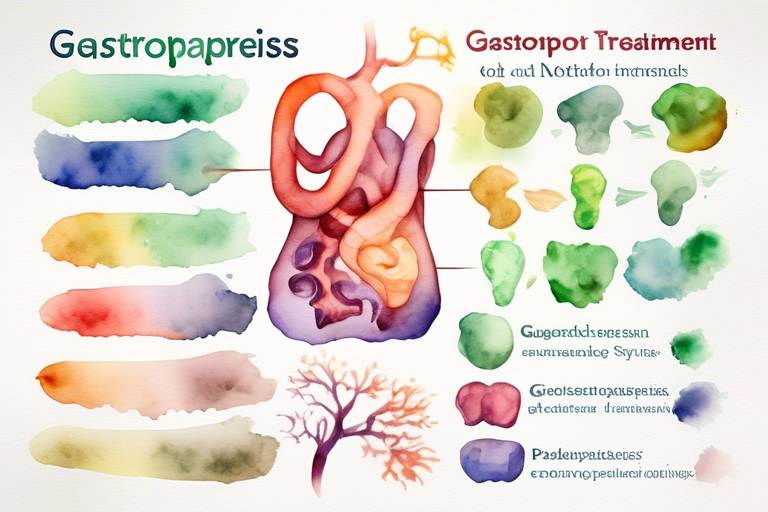Gastroparezi, sindirim sistemi problemi olan bir durumdur ve erken doygunluk, mide bulantısı, şişkinlik, kusma ve karın ağrısı gibi birçok farklı belirtiye neden olabilir Gastroparez tedavisi, diyet değişiklikleri, ilaçlar ve yaşam tarzı modifikasyonları gibi farklı yaklaşımların bir kombinasyonunu içerir Diyet değişiklikleri, ilaçlar ve altta yatan koşulların yönetimi sayesinde semptomların etkili bir şekilde yönetilmesi ve yaşam kalitesinin artırılması mümkündür

Gastroparesis can cause a variety of symptoms, which can vary in severity and frequency from person to person. These symptoms can include:
- Early satiety: Feeling full after only a few bites of food
- Nausea: Feeling queasy or sick to your stomach, often accompanied by vomiting
- Bloating: Feeling like your stomach is swollen or puffed up
- Abdominal pain: Pain or discomfort in your stomach or belly
- Heartburn: A burning sensation in your chest or throat, especially after eating
- Gastroesophageal reflux: Acid reflux or regurgitation of stomach contents back into your esophagus
- Changes in blood glucose levels: Gastroparesis can make it difficult to control your blood sugar, leading to fluctuations in glucose levels
If you are experiencing any of these symptoms, especially if they are severe or persistent, it is important to seek medical attention. Gastroparesis may be an underlying cause that needs to be addressed.
Symptoms of Gastroparesis
Gastroparesis, also known as delayed gastric emptying, is a condition that affects the digestive system and can cause a range of symptoms. The symptoms of gastroparesis can vary from person to person, but some of the most common ones include early satiety, nausea, bloating, vomiting, and abdominal pain. People with gastroparesis may also experience weight loss and malnutrition if the condition is not managed effectively, as the body may not be able to absorb essential nutrients properly.
In addition to these symptoms, some people with gastroparesis may also experience heartburn, gastroesophageal reflux, and changes in blood glucose levels. These changes in blood glucose levels can be particularly concerning for people with diabetes, as they can affect their ability to manage their condition effectively.
It is important to note that the symptoms of gastroparesis can be similar to those of other digestive disorders, such as irritable bowel syndrome (IBS), so it is essential to consult a healthcare provider to receive a proper diagnosis and effective treatment.
Treatment for gastroparesis often involves a combination of approaches, including dietary changes, medication, and lifestyle modifications. Eating smaller, more frequent meals and avoiding fatty, high-fiber foods can help manage symptoms and improve digestion. Medications, such as prokinetic agents, can also be prescribed to help speed up the emptying of the stomach. In severe cases, surgery may be necessary.
Managing underlying conditions, such as diabetes and hypothyroidism, can also improve symptoms and prevent complications. Therefore, if you experience any symptoms of gastroparesis, it is crucial to consult a healthcare provider promptly to receive a proper diagnosis and the most effective treatment.
Treatment Methods for Gastroparesis
Gastroparesis is a condition that can have a significant impact on a person's quality of life. Although there is no cure for this condition, it can be managed using a combination of approaches. One of the main treatments for gastroparesis is dietary changes. Eating smaller and more frequent meals can help to reduce symptoms, as can avoiding fatty and high-fiber foods. It's also important to drink plenty of fluids to ensure that the body stays properly hydrated.
In addition to dietary changes, medications can be prescribed to help speed up the emptying of the stomach. In severe cases, surgery may be necessary. It's important to note that underlying conditions such as diabetes and hypothyroidism can also impact the symptoms of gastroparesis. Managing these conditions is crucial to the effective management of gastroparesis.
Overall, gastroparesis is a complex condition that requires a multifaceted approach to treatment. By making lifestyle changes, taking medications, and managing underlying conditions, it is possible to effectively manage symptoms and improve quality of life.
